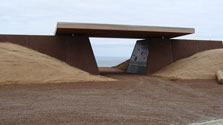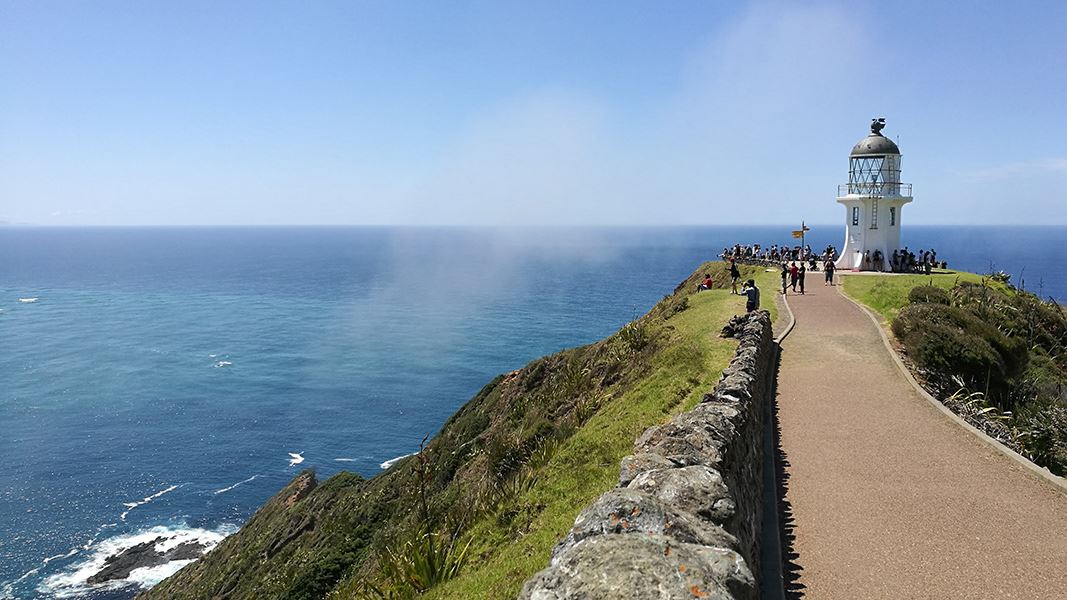From Kaitaia it is a 1 hour 30 minutes drive north on SH1.
Cultural protocol for visiting Cape Reinga/Te Rerenga
Cape Reinga/Te Rerenga Wairua is a highly significant place for Māori. There are tikanga (cultural protocols) for visiting here. Please do not eat any food at Cape Reinga/Te Rerenga Wairua. It is fine to drink water.
If you wish to eat, Tapotupotu is a nice alternative. It is 5-10 min drive on a gravel road, with toilets available.
People sometimes wish to bury or scatter the ashes of their loved ones at Cape Reinga/Te Rerenga Wairua. As the cape is a sacred site, this is not culturally appropriate. It is a lovely place to remember people who have passed, but please do not bury or scatter any ashes here.
No camping is permitted
No camping is allowed at Cape Reinga/Te Rerenga Wairua. The nearest campground is at Tapotupotu and is managed by local Iwi Ngāti Kuri. Bookings are required at Taputaputa Campsite – read about the campsite and make a booking here.
Stay on the track, leave pets at home, and take your rubbish with you
There are no rubbish bins at Cape Reinga/Te Rerenga Wairua, so take all rubbish away with you. Stay on the track. No pets are allowed, including no dogs.
Visit off-peak for a quieter experience
Cape Reinga/Te Rerenga Wairua gets very busy in late December-early January and in the middle of the day (11 am-3 pm). If you wish to explore the area with fewer other visitors present, we recommend visiting in the early morning or late afternoon. Gates are closed to the car park between 8.30pm and 7am.
Weather forecast
Be ready for windy weather – the cape is very exposed, the weather changes fast and strong wind is common.
Cape Reinga/Te Rerenga Wairua weather forecast – NIWA website
Completed in March 2009, a $6 million upgrade of the visitor facilities was a result of a close working relationship built up over the years between DOC and local iwi and kaitiaki (guardians) of the area, Ngati Kuri.

Portico / waharoa
A concrete portico or waharoa (the gateway) leads to the beginning of the new walking track and initially only shows glimpses of Cape Maria Van Diemen and Motuopao Island. As you walk through the portico, the entire vista opens up before you, and Te Werahi Beach appears.
Specially designed panels on the portico’s interior depict a historical map, thought to be the first known map of Aotearoa to be drawn by Tuki Tahua over 200 years ago. The roof on top of the portico is made from certified sustainable wood – eucalypt and cedar.
Interpretation signage at key spots helps you to learn more about the geology, ecology, history and culture of the area.
Check, Clean, Dry
Clean all gear when moving between waterways to prevent the spread of didymo and other freshwater pests.
Stop kauri disease and protect kauri
- Scrub all soil off shoes and gear.
- Use cleaning stations.
- Always stay on the track.
DOC Customer Service Centre
| Phone: | 0800 275 362 |
| Email: | kaitaia@doc.govt.nz |
| Address: | Te Hiku / Kaitaia Office |
